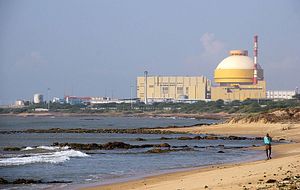The macroeconomic projections made by the world’s leading global financial institutions have noted India’s potential to land among the top three top economies of the world by the end of the next decade. However, one of the roadblocks for accelerating the pace of India’s development is the shortage of power to meet its growing demands. India is currently producing 1,068,923 million units of electricity annually, which falls short of actual needs by 3.6 percent. It is estimated India would require over 1.50 million units to meet its energy requirements by 2024.
India’s present per capita power consumption is around 940 kilowatt-hours (kWh), which is among the lowest in the world. By comparison, China’s per capita consumption is over 4,000 kWh. If India wants to be anywhere near China, huge investments are required in the power sector, especially in clean energy.
The present power requirements heavily depends on coal, as it accounts for 60 percent of India’s power needs. Due to supply constraints, India is already importing coal to meet its requirements. If India is to augment its energy needs, it has to invest heavily in solar power and wind energy, as well as nuclear power. Some work has already begun; India plans to invest over $100 million in solar power in the next five years. This investment would increase India’s solar energy from 4GW to 100 GW by 2022.
India is also looking to augment its energy supply by building 20 more nuclear reactors. Notably, importing uranium is significantly cheaper than importing gas, coal, or petroleum. This is significant for a country that is faced with depleting natural resources.
Against this backdrop comes the recent signing of a civil nuclear agreement with Japan during Modi’s visit to Tokyo. The deal with Japan comes on the back of 123 nuclear agreement signed with the United States in 2008.
However, India will face two major challenges in building new reactors. First, acquiring land is complex and has to overcome legal impediments because of an archaic land act. The opposition parties, led by Congress, have refused to support a move made by the government to amend the Land Acquisition Act because they feel it would deprive the farmers of their livelihood.
Second, nuclear projects in India has historically faced strong public opposition. There were widespread protests when the Kudankulam nuclear power plant was being built with Russian assistance in the state of Tamil Nadu, especially from the fishermen residing near the plant, because of the fear of radiation leaks. Similarly, there were protests by local villagers against the building of Jaitapur Nuclear Power Project, whose technology has been provided by France, in Ratnagiri district in the state of Maharashtra. The anti-nuclear lobby and the local residents don’t want Fukushima and Chernobyl-like incidents happening in India.
In that sense, it is ironic that Japan, which canceled the construction of over 12 new nuclear reactors in its own country after the meltdown at the Fukushima Daiichi power plant in 2011, should have agreed to sign a civil nuclear agreement with India. The Japanese decision comes in the wake of the inability of Japanese companies to compete with low-cost reactors being built by Russia and South Korea. Thus signing of the agreement probably represents an attempt to bail out companies like Toshiba and Hitachi, allowing them to recover huge investments in research and development as well as capital costs. Now Japanese nuclear power has a massive new market in India.
The growing friendship between India and Japan is part of the changing geopolitical landscape in South and Southeast Asia. Japan is fearful of Chinese dominance and sees in India a perfect ally to act as a counterweight to China. However, it is in India’s interests to maintain cordial relations with China, as any conflict with that country would only impede India’s economic progress. Moreover, Modi has been trying to improve India’s relations with all its neighbors, including China.
India has a lot to gain from China, as China can assist India in setting up manufacturing facilities, constructing infrastructure, building the power sector and modernizing India’s rail transportation system, where China has considerable expertise.
On the other hand, China continues to act against India’s interests, like it did by blocking India’s membership to the Nuclear Suppliers Group, and by siding with Pakistan to block India’s request for a United Nations ban on Pakistan based Masood Azhar, chief of Jaish-e Mohammad, who was allegedly, involved in the Mumbai and Pathankot attacks. If China continues with its policy, it will only succeed in unwittingly forcing India to look for other options to safeguard its interests, which may not be in China’s interest. The nuclear deal with Japan is just the latest example.
K.S. Venkatachalam is an independent columnist and political commentator.

































